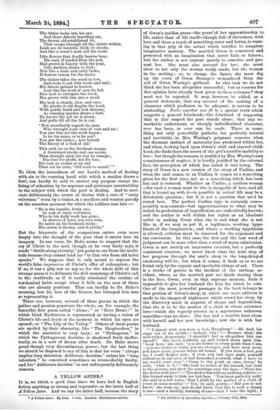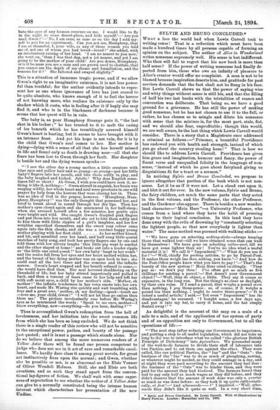A YELLOW ASTER.*
IT is, we think, a good time since we have had in English fiction anything so strong and impressive as the latter half of A Yellow Aster. And we say the latter half, because the story • A Yellow Aster. By Iota. 3 vols. London: Hutchinson and Co.
of Gwen's maiden years—the years"of her apprenticeship to life, rather than of life itself—though full of cleverness, with here and there a touch of something rarer and better, is want- ing in that grip of the actual which testifies to complete imaginative mastery. The married Gwen is conceived and presented with an imagination that never fails or falters ; but the author is not content merely to conceive and pre- sent her. She must also account for her; she must show us not only the woman ready - made, but the woman
in the making ; or, to change the figure, she must dig up the roots of Gwen Strange's womanhood from the soil of Gwen Waring's girlhood. In this task we do not think she has been altogether successful; but as reasons for
this opinion have already been given in these columns,* they
need not be repeated. It may, however, be added, as a general statement, that any account of the making of a character which professes to be adequate is certain to be misleading. Poeta nascitur non fit is a special truth which suggests a general falsehood,—the falsehood of supposing
that in this respect the poet stands alone; that any re- markable endowment, or sharply individualised character,
ever has been, or ever can be, made. There is some- thing not only powerfully pathetic, but perfectly natural
and inevitable, in Mrs. Waring's poignant remorse when the dormant instinct of maternity has awakened within her,.
and when, looking back upon Gwen's chill and starved child- hood, she finds there the secret of the girl's terrible inability to love; but though the remorse is justified by Mrs. Waring's own consciousness of neglect, it is hardly justified by the external fact, the perception of which has called it into being. The story of Gwen is a new version of the story of Undine, and when the soul comes to an Undine, it comes as a something given for the first time, not as a something which has been lost and is restored. Whether as Undine, a soulless woman —for such a woman must be who is incapable of love, and all that is bound up with it—is possible in actual life may be a debateable question ; but it is not a question that need be raised here. The perfect Undine type is certainly rare— possibly non-existent—but approximations to what may be called its perfectness of imperfection are undoubtedly known; and the author is well within her rights as an idealistic artist in making Gwen what she is and what she is not.
She is, if we may so put it, a legitimate working hypo- thesis of the imagination ; and where a working hypothesis is allowed, criticism must be reserved for the argument and the conclusion. In this case, the first and the last word of judgment can be none other than a word of warm admiration.
Gwen is not merely an impressive creation, but a perfectly consistent creation ; we never know what the next step of her progress through the soul's sleep to the long-delayed awakening will be ; but when it comes, it finds us as we are found only by the organic and inevitable things of art. There is a stroke of genius in the incident of the carriage ac- cident, where, as the married pair see death staring them in the face, Gwen, even in that supreme moment, finds it
impossible to give her husband the kiss for which he asks. One of the moat powerful passages in the book belongs to that portion of Gwen's story, in which one more addition is made to the images of nightmare which crowd her sleep, by the discovery made in anguish of shame and degradation,
that she is to be the mother of a child in whose existence love—which she vaguely reveres as a mysterious unknown
sanctifier—has no share. She has had a terrible hour alone with herself and her new knowledge ; now she is with her
husband.
" I almost wish you were a fool, Humphrey ! '—He took his cigar out of his mouth.—'Indeed, why ? '—' Because then,' she said rather desperately, I shouldn't feel so altogether like one myself I' She stood suddenly up, and looked down upon him. Look here,' she said; 'you are better in every point than I am,. —you are better in brain, you are stronger, you have seen more, you know more, you are better all round. If you were a fool, you see, I could despise you; if even you bad once made yourself ridiculous in my eyes, or had demeaned yourself, what I have to say would come easy.'—' Come to the point at once, Gwen,' he said ; 'what is it ? '—She took no notice of his remark, but went to the picture, and drew the coverings over the face.= What has the doctor told you ? '—' The doctor has told me nothing definite.'— She turned away to hide her hot face. You know perfectly well,' she said in a low voice, 'that I shall be the mother of a child of yours in some months.'—' Yes,' he said, gently.= But you do not know,' she went on, you do not know, that this is such a shame to me—such a deathly, burning shame—that I hate the light; I * The Children of Agnostics, Spectator, February 17th. 1834. hate the eyes of any human creature on me. I would like to fly in the night to some desert-place, and hide myself.'—' Are you mad, Gwen ? No, I am sane, as sane as on the day I sold my- self to you for an experiment. Can you not see, Humphrey, that I am as shameful, I, your wife, as any of those women you told me of. not one of whom you had loved—loved ?' she added, with an involuntary raising of her head. am no nearer to you now,' she went on, • than I was that day, not a jot nearer, and yet I am going to be the mother of your child ! Are you dense, Humphrey, or is it because you are a man and are grown used to chattels, that you cannot see the depth of my shame and humiliation, and the reasons for it ? ' She faltered and swayed slightly."
This is a situation of immense tragic power, and if we allow Gwen's right to an imaginative existence, it is not leas power- ful than truthful; for the author evidently intends to repre- sent her as one whose ignorance of love has just ceased to be quite absolute, who knows enough of it to feel the horror of not knowing more, who realises its existence only by the
shadow which it casts, who is feeling after it if haply she may find it, and who is in the blackness of darkness because it seems that her quest will be in vain.
The baby is, as poor Humphrey Strange puts it, "the last shot in his locker ; " he has trusted to it to melt the casing of ice beneath which he has tremblingly assured himself Gwen's heart is beat:ng, but it seems to have brought with it an intenser frost. And yet his hope is not vain, for it is by the child that Gwen's soul comes to her. Her mother is dying—dying with a sense of all that she has herself missed in life and found only as death is drawing near—all that she fears has been lost to Gwen through her fault. Her daughter is beside her and the dying woman speaks :- "' I saw the other day a young mother, a little creature with blue eyes and yellow hair and so young—so young—put her little baby's fingers into her mouth, and bite them softly in play, and the baby laughed and kicked. Jubelle ! Why does English some- times fall so short ? Ah Gwen, I wish you could have seen it, no- thing is like it, nothing—' Gwen stirred in anguish, her brain was surging wildly, her whole heart and soul were prostrate in one wild. prayer for help from the horrors that were closing her in. There was no idea of God in the prayer, however. ' Humphrey, Hum- phrey, Humphrey !' was the only thought that possessed her, and tried to break aloud in sound through her dry lips. Then her mother's eyes closed again and she murmured in her half-sleep ; when she aroused herself after a few minutes, her gentle eyes were bright and wild. She caught Gwen's dimpled pink fingers and put them into her mouth, and she set to bite them softly and to kiss them with little ripples of a girl's laughter, and her few wrinkles smoothed themselves and the sweet rosy colour came again into the thin cheeks, and she was a careless happy young mother playing with her first child A s her mother kissed, and bit, and mumbled over her hand, and half sung little quaint snatches of baby song, and took her pretty fingers one by one and told them with low silvery laughs 'this little pig went to market and the other stayed at home ! ' and broke out into a louder ripple as the little one cried queak !' her own baby leapt in her womb ' and the scales fell from her eyes and her heart melted within her, and the breast of her dying mother was an open book to her; she could read all the love there and the remorse and the infinite sorrow. Gwen's heart stopped and her breath refused to come,— she would have died then. Her soul hovered shuddering on the threshold of life, but her baby stirred imperiously and pulled it back, and then a torrent of tears came to her help and left her with soft moist eyes, a child by her mother's side. Mother, oh mother ! ' the infinite tenderness in her voice smote into her own heart, and made Mr. Waring rise quickly and wait trembling with fear and a great awe, mother, oh my darling—speak—touch me —love me, your child, Gwen!" I will not let thee go unless thou bless me.' The picture involuntarily rose before Mr. Waring's eyes as he murmured the words : Speak to me once, mother—I know everything, now—everything—do you hear, darling ? "
Thus is accomplished Gwen's redemption from the hell of lovelessness, and her initiation into the sweet common life from which she has been so long excluded. We do not think there is a single reader of this review who will not be sensitive to the exceptional power, pathos, and beauty of the passage
just quoted; and it is not a passage which stands alone. Nor do we believe that among the more numerous readers of A Yellow Aster there will be found one person competent to judge who does not see in it art of rare and remarkable excel- lence. We hardly dare class it among great novels, for great art instinctively fixes upon the normal; and Gwen, whether she be possible or not, is as abnormal as the Elsie Vernier of Oliver Wendell Holmes. Still, she and Elsie are both creations, and as such they stand apart from the conven- tional lay-figures of fiction. We shall wait with some eager- ness of expectation to see whether the writer of A Yellow Aster Lan give to a normally constituted being the intense human interest which characterises her presentation of the new ITndine.



































 Previous page
Previous page